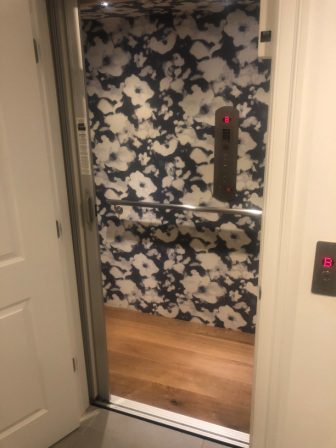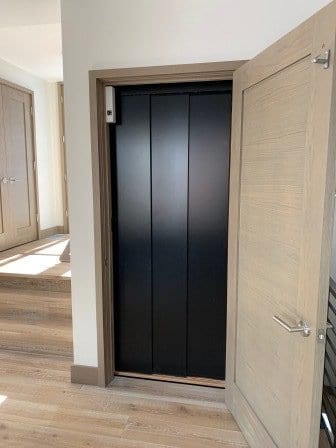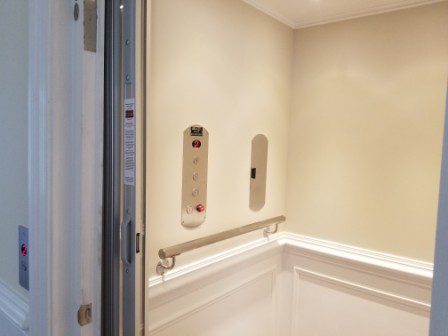An elevator purchase is a serious investment in your home and future, so it’s only natural you’ll have questions for your elevator dealer before the installation process starts. Knowing which questions you need to ask is essential: it’s not unusual for homeowners to forget to ask important questions.
Your elevator dealer will answer questions at any point in the installation process, but if you can get all your questions answered in the consultation stage, you’ll be able to make informed decisions about your residential elevator purchase and move forward with installation at a faster rate.
With that in mind, we’ve compiled a list of fifteen questions about small residential elevators you should ask when meeting with your elevator dealer, along with some pointers on what you should look for in the dealer’s answers. Check them out, and you’ll gain a foundation of solid facts going into your first elevator consultation.
1. How Much Space Will I Need for a Home Elevator?
Even small residential elevators take up several square feet of your home’s living space. Typically, the minimum space required for a residential elevator is 20 square feet. Depending on your home’s floor plan, you may be able to install the elevator and its shaft in a large closet.
When calculating your elevator space requirement, you need to consider the elevator’s height and the size of the shaft pit, which is usually six to eight inches deep. If a machine room is required, the size of the room should be included in the minimum space necessary for the residential elevator. You can find more information on elevator space requirements at How Much Space Do You Need for a Home Elevator?
2. Can You Install a New Elevator in an Old House?
The minimum space required for residential elevator installation can make installing a new elevator in an old house challenging, but don’t fret. You can retrofit an old house for a home elevator, although you may find your choice of location and type of elevator more limited than if you lived in a home with modern floor plans.
3. What are the Elevator’s Electrical Requirements?
Small residential elevators must be attached to your home’s electrical system. Most home elevators require 240 VAC, but some, such as shaftless elevators, can operate on 120 VAC.

4. What Type of Home Elevator is Best for My Needs?
You have your choice of several elevator types when making your elevator purchase. Your home elevator consultant will explore your options with you so you can choose the best elevator for your needs and your home. Typically, you’ll have the choice of the following options:
- Inline gear elevators, which do not require machine rooms.
- Hydraulic drive elevators, which use hydraulic rams and pistons for exceptionally quiet rides.
- Winding drum drive elevators, a time-tested drive where heavy-duty cables are attached to a rotating drum.
- Shaftless home elevators are small residential elevators that are ideal when floor space is limited.
- Pitless elevators, for situations where home conditions do not allow for the installation of an elevator pit.
5. Would it be Better to Install a Home Elevator or a Wheelchair Lift?
Choosing a home elevator or a wheelchair lift for home use depends on multiple factors. Unlike an enclosed elevator, a wheelchair lift is not always fully enclosed and can usually be installed with few site modifications. Wheelchair lifts can only transport the user up and down a single floor, so home elevators are better suited for multi-level homes.
6. How Many People Can Fit into the Home Elevator?
Residential elevators have an average lift capacity of 1,000 pounds, more than enough for four people. The size of the elevator car, however, usually limits the elevator to the number of people it will hold. A typical home elevator car size is 15 square feet.
7. What is Included in an Elevator Installation Estimate?
It’s important to understand what’s included in an elevator dealer’s installation estimate, especially if you compare multiple estimates. A thorough estimate should include the cost of the design, pre-construction and installation costs, customized options and add-ons, and support for the permit and inspection.

8. What Safety Features are Included with the Elevator?
The American Society of Mechanical Engineers (ASME) and the American National Standards Institute set the safety regulations for residential elevators. To meet building codes, your home elevator should provide the following safety features:
- Backup battery power in case of power outages.
- A phone installed in the elevator car.
- An alarm in the elevator car to alert people if you need assistance.
- An emergency lighting system in case of a power outage.
- Interlocking elevator doors which only open when the car is in the correct position.
9. How Do I Ensure there is Not Too Large a Gap Between the Doors?
The national ASME A17.1 code is a voluntary safety standard prepared by elevator and engineering professionals. It is used to dictate the safest laws with which home elevator installations should comply. The newest code is adopting the ¾” x 4” rule. This lessens the area between the hoistway door and car gate/door. You will want to confirm with your contractors what they are doing to meet this code.
10. Who Will Install the Elevator?
You want to make your elevator purchase from an experienced dealer whose services include installation, rather than one who sub-contracts the job. Ask the dealer for an installation timeline, so you know what work will be done on specific dates.
11. Who is Responsible for Maintenance After Installation?
Who will provide technical service and maintenance after your elevator purchase and installation? Most manufacturers do recommend you have your elevator serviced twice a year buy a licensed elevator contractor. You can typically set up maintenance agreements with your installing dealer. You may also ask if the dealer provides 24/7 emergency repairs, especially if your access to areas of your home would be limited without using the elevator.
12. What are Your Customization Options?
Creating the look of your elevator is one of the most exciting parts of an elevator purchase. Ask your elevator dealer about customization options and which add-ons they would recommend. Cosmetic customization includes car walls, door styles, light fixtures, and flooring. You can also opt for added mobility features, such as grab bars or a flip-up seat for the elevator car. Think about your preferences so you can clearly explain how you want the elevator to look.

13. What is Covered Under the Elevator Warranty?
Read the warranty carefully before making an elevator purchase. The warranty should cover defects in material and workmanship under normal use. Symmetry Elevators covers our residential elevators with an industry-leading three-year limited warranty.
14. How Much Will the Elevator Cost?
The base cost of a home elevator depends on the type of elevator and any customizations you choose. To this amount, you should add the cost of installation and bi-annual maintenance. Go over the cost with the dealer prior to your elevator purchase, and review all costs carefully.
15. Who Do I Contact with Questions?
Be sure you know who your contact is with the elevator dealership. Regular communication with your dealership contact makes construction and installation go smoother. Also ask who to contact concerning maintenance and repairs, as this person probably won’t be the same person who guides you through the installation process.
Ready to begin your journey towards an elevator purchase? Contact your local Symmetry Elevators dealer to explore which residential elevator is the right choice for your home and needs.

